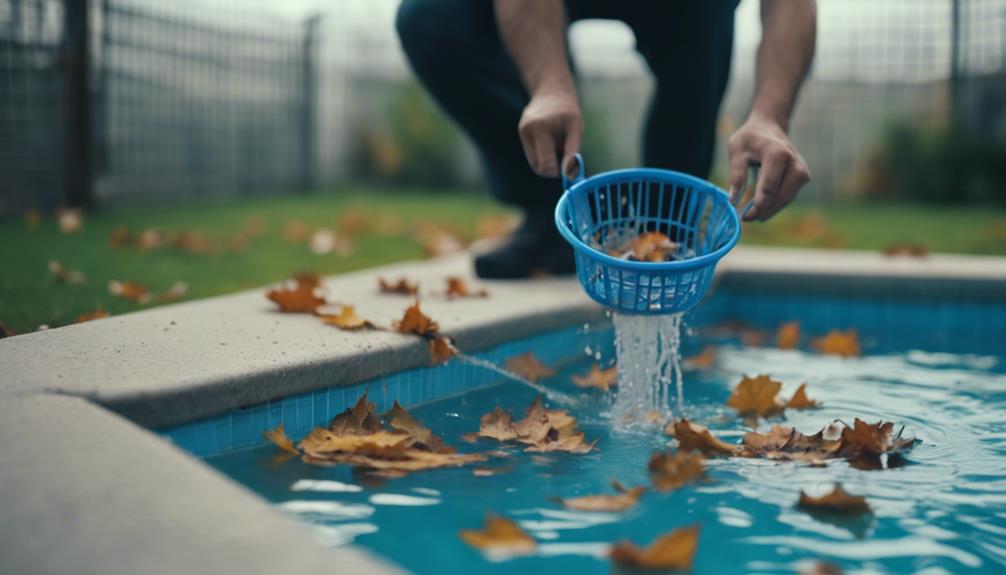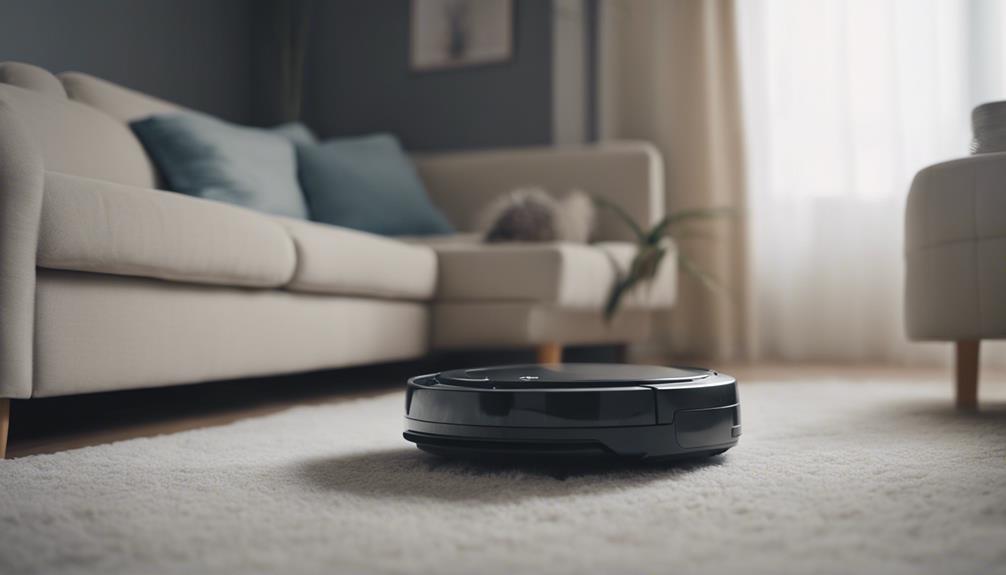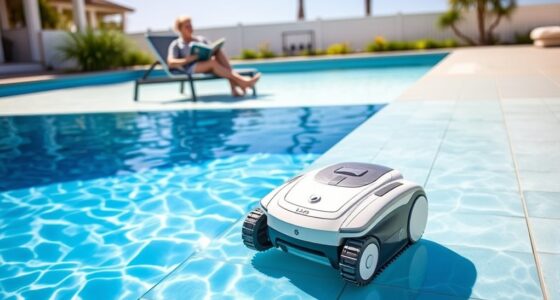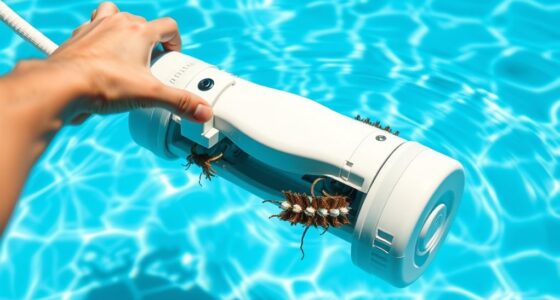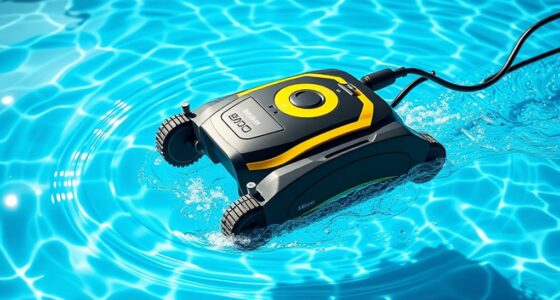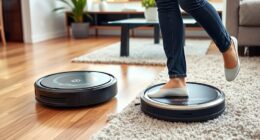To address common pool issues, be sure to investigate pump noise caused by debris or loose parts. Test water clarity by checking pH levels and maintaining the correct chemical balance. Correct stains by identifying them and using the appropriate stain remover. Follow proper draining techniques and check for leaks either visually or by using a dye test. Prevent debris buildup by regularly skimming and vacuuming. Deal with pool pump problems by examining impellers, tightening parts, and lubricating bearings. Don’t forget to prime the pump for efficient water circulation. These suggestions will assist you in effectively managing pool problems.
Key Takeaways
- Regularly clean filters and maintain chemical balance for water clarity.
- Inspect pump for debris and damage, tighten components.
- Test and adjust pH levels, maintain sanitizer levels for algae prevention.
- Use appropriate stain removers and seek professional help for stubborn stains.
- Utilize dye tests for leak detection, inspect pool equipment for leaks.
Pump Noise
To troubleshoot pump noise in your pool, start by checking for debris clogging the pump intake. Debris such as leaves or twigs can obstruct the flow of water, causing the pump to work harder and generate noise.
Make sure the pool filter is clean to prevent debris from entering the pump intake and causing disturbances. Additionally, inspect the pump impeller for any signs of damage that could be contributing to the noise. If the impeller is damaged, it may need to be repaired or replaced to resolve the issue.
Tighten any loose pump components, such as bolts or fittings, as they can vibrate during operation and create noise. Lubricate the pump motor bearings regularly to reduce friction and noise. Proper lubrication can help the motor run smoothly and quietly.
Water Clarity
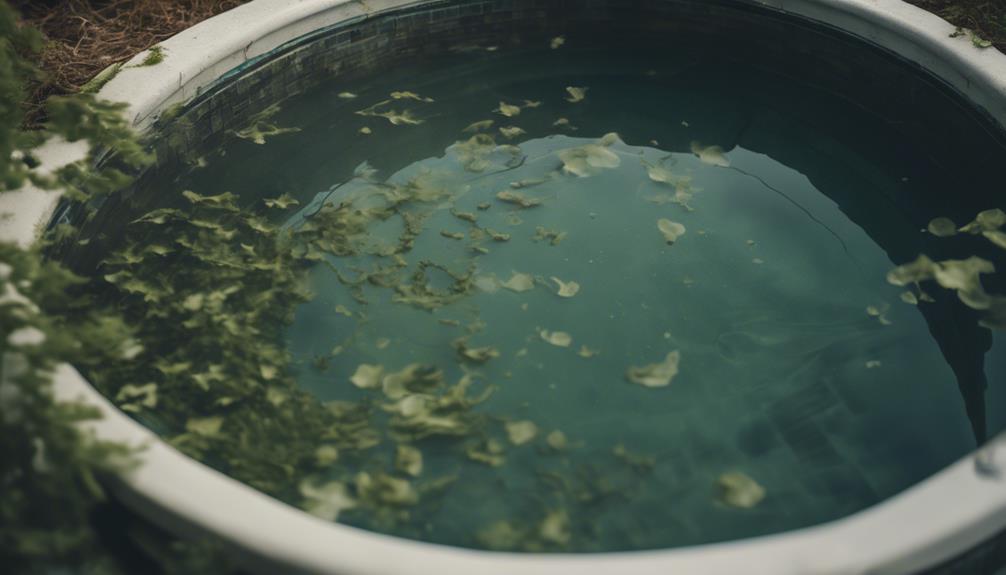
To maintain water clarity in your pool, it's essential to understand the causes of cloudy water. Factors like improper filtration, unbalanced pH levels, and insufficient sanitizer can lead to murky pool water.
Cloudy Water Causes
Guarantee proper water clarity by addressing the common causes of cloudy water in your pool. Cloudy water can often be attributed to imbalanced pH levels. To guarantee your pool stays crystal clear, consider the following:
- Check pH Levels: Test the water regularly and adjust pH levels as needed to keep them within the recommended range.
- Inspect Filtration System: Verify your pool filter is functioning correctly by checking for any clogs or malfunctions that could impede proper filtration.
- Maintain Chemical Balance: Keep sanitizer levels in check and balance other chemicals to prevent cloudiness.
- Promptly Address Issues: If you notice any cloudiness in the water, take immediate action to troubleshoot and resolve the problem before it worsens.
Algae Prevention Methods
Maintain proper water clarity in your pool by implementing effective algae prevention methods. Algae growth can be kept at bay by making sure the sanitizer levels are adequate and promoting good circulation. Regularly shocking the pool with chlorine helps eliminate existing algae and prevents new spores from forming.
Additionally, brushing and vacuuming the pool walls and floor can effectively remove algae buildup and hinder further growth. It's essential to balance the pool's chemical levels, such as pH and alkalinity, to create an environment that's unsuitable for algae to thrive. Incorporating algaecides into your routine pool maintenance can also be beneficial in combating algae growth.
Filtration System Maintenance
For best water clarity in your pool, make sure you regularly clean and backwash the filtration system. Proper filtration is essential for removing debris and contaminants that can cloud your pool water.
Here are some essential maintenance tips for your pool filtration system:
- Regularly clean and backwash the pool filter to maintain peak filtration efficiency.
- Check and replace filter media when necessary to prevent clogs and enhance water clarity.
- Inspect and clean filter cartridges or grids to guarantee proper water circulation.
- Adequate filtration system maintenance helps prevent cloudy water and algae growth in your pool.
Stains Removal
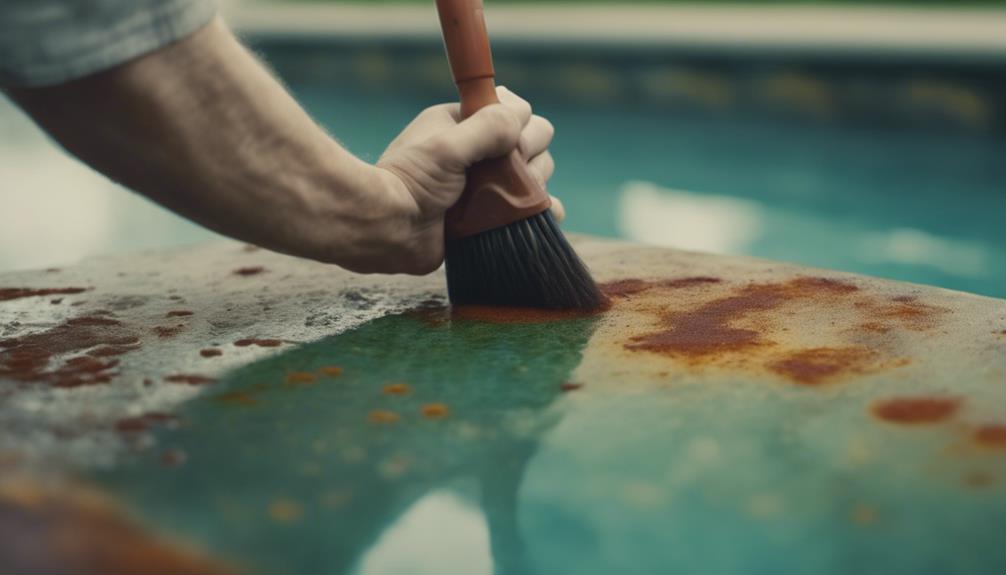
When dealing with pool stains, accurately identifying the type of stain is crucial to choose the most effective remover for successful removal.
Use the recommended stain remover and gently scrub the stained area to minimize damage to the pool surface.
Regular pool maintenance can help prevent future stains and keep your pool looking clean.
For stubborn stains, consider seeking professional help to guarantee proper removal without causing further damage.
By using the right pool stain remover and following proper removal techniques, you can maintain the appearance and integrity of your pool.
Remember to follow the instructions on the stain remover carefully to achieve the best results.
Keeping your pool free from stains not only enhances its aesthetic appeal but also prolongs the lifespan of your pool surface.
Stay proactive in stain removal to enjoy a sparkling and inviting pool for all your swimming and relaxation needs.
Draining Methods
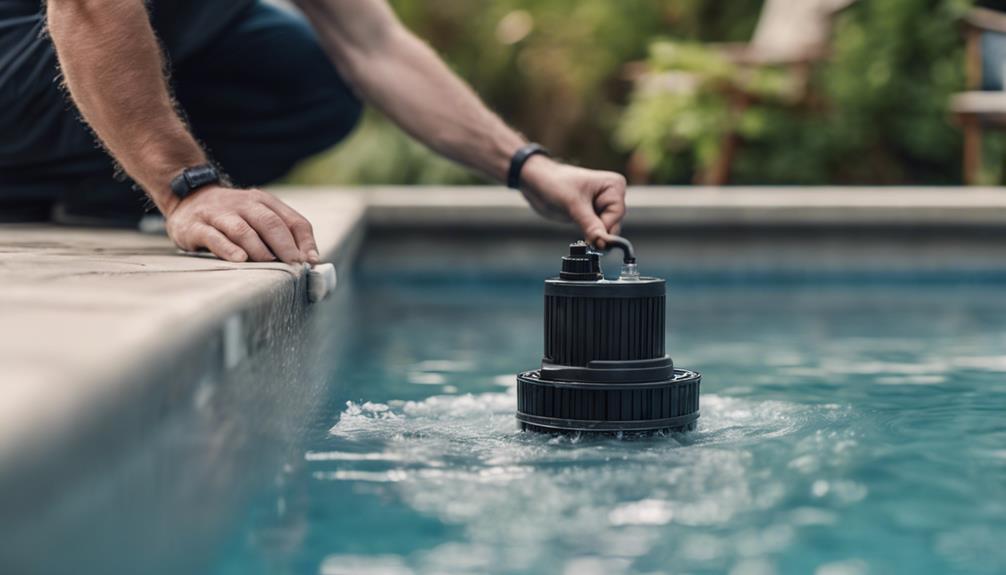
Consider utilizing a garden hose siphon for a cost-effective and easy manual pool draining method. If you have a larger pool or need faster drainage, a sump pump could be a suitable option. Remember to always follow local regulations for pool draining to maintain environmental and safety standards.
While draining, inspect the pool liner and equipment for any signs of damage. If you have a complex drainage situation, it might be wise to seek professional help to guarantee the process is done correctly and efficiently.
Leak Detection
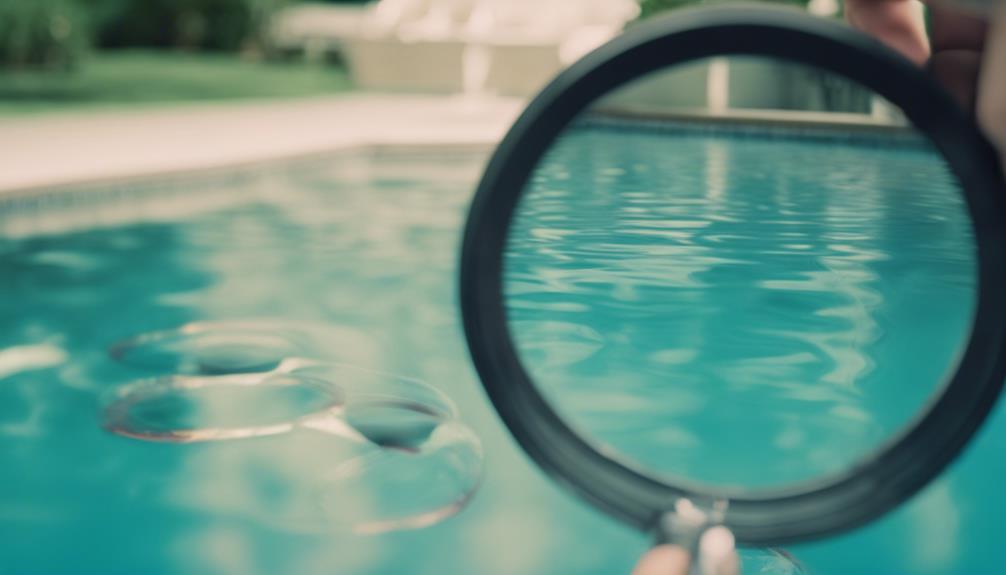
To detect leaks in your pool, start with a visual inspection to look for any visible signs of water loss.
Additionally, you can use a dye test by injecting dye near suspected areas and observing any color changes in the water.
These methods can help you pinpoint the location of a leak and take necessary steps to repair it promptly.
Visual Inspection for Leaks
Perform a thorough visual inspection around your pool area to identify any visible signs of leaks, such as wet spots or puddles, as part of your leak detection process.
When conducting your visual inspection, pay close attention to the following:
- Check for cracks or damage in the pool structure, including the walls, floor, and around fittings like skimmers and drains.
- Inspect the pool equipment, such as pumps, filters, and plumbing connections, for any signs of water leakage.
- Look for damp areas in the soil or grass surrounding the pool, as these can indicate a leak in the underground plumbing.
- Examine the pool deck for any signs of water seepage or damage that may suggest a leak in the pool's structure.
Using Dye Test
Utilize a dye test as a straightforward method to detect leaks in your pool by introducing dye into the water. Add a few drops of a brightly colored dye like red, blue, or black near any suspected leak areas.
Observe the movement of the dye carefully; if it gets pulled towards a crack or hole, you've likely found the source of the leak. This simple test helps pinpoint the exact location of the leak, making repairs more efficient.
By using a dye test, you can save time and effort that might've been spent searching for hidden leaks. Remember to conduct the test in a calm pool without strong currents to guarantee accurate results.
Once you identify the leak, you can take necessary steps to fix it promptly, keeping your pool in good condition for enjoyable swimming experiences.
Debris Check
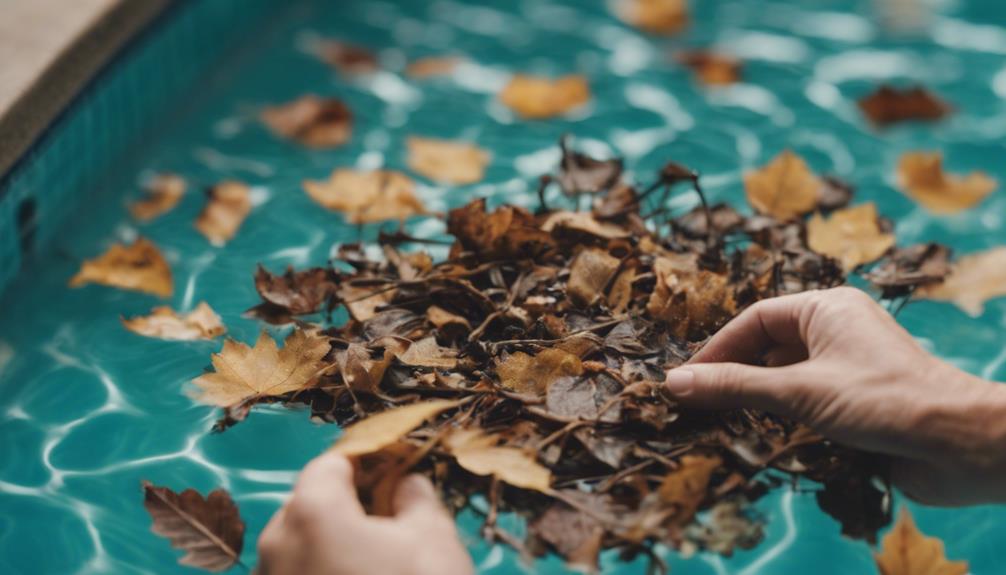
Regularly inspecting your pool for debris, such as leaves, insects, and dirt, is crucial to prevent clogs and contamination.
Here are some tips to help you effectively manage debris in your pool:
- Skim the pool's surface: Use a skimmer to remove floating debris quickly, keeping the water clear and inviting.
- Check the filtration system: Debris can impact the pool's filters, leading to poor water quality. Make sure you remove any debris promptly to maintain efficient filtration.
- Vacuum the pool: Regularly vacuuming the pool floor and walls helps eliminate debris buildup, keeping your swimming environment clean and enjoyable.
- Maintain the pool area: Beyond the water, keep the pool area clean to prevent debris from entering the pool and causing issues.
Pump Impeller Inspection
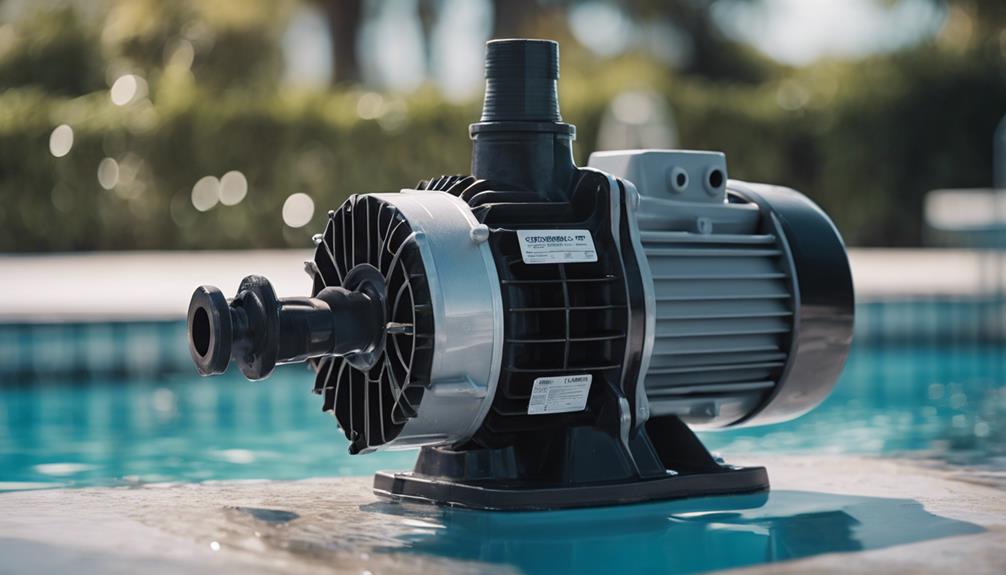
Examining the pump impeller is essential to maintain ideal water circulation in your swimming pool filtration system. The impeller plays a critical role in moving water through the filtration system, so it's important to check for any damage or debris buildup that could hinder its function. Regular inspection and cleaning of the impeller are necessary to prevent reduced water flow and inefficient filtration, guaranteeing that your pool pump operates efficiently.
To help you understand the importance of pump impeller inspection, here's a table summarizing key points:
| Pump Impeller Inspection | |
|---|---|
| Importance | Ensures proper water circulation |
| Maintenance | Regular cleaning prevents issues |
| Issues | Damage can lead to reduced flow |
| Solution | Replace if damaged for best function |
| Tip | Clean impeller regularly for top results |
Component Tightening

Ensuring the tightness of pool components, such as pump impellers and fittings, is essential for preventing leaks and maintaining peak performance. Loose components can lead to inefficiencies in the pool system and potential damage over time. Regularly checking and tightening pool equipment can help maintain a safe and functional swimming environment.
Properly tightened components help prevent water loss, reduce energy consumption, and extend the lifespan of pool equipment. If you notice any rattling or unusual noises coming from the pool system, it may indicate a need for component tightening.
- Tightening pool components prevents leaks and ensures optimal performance.
- Loose components lead to inefficiencies and potential damage.
- Regular checks maintain a safe swimming environment.
- Properly tightened components prevent water loss, reduce energy consumption, and extend equipment lifespan.
Lubricating Bearings
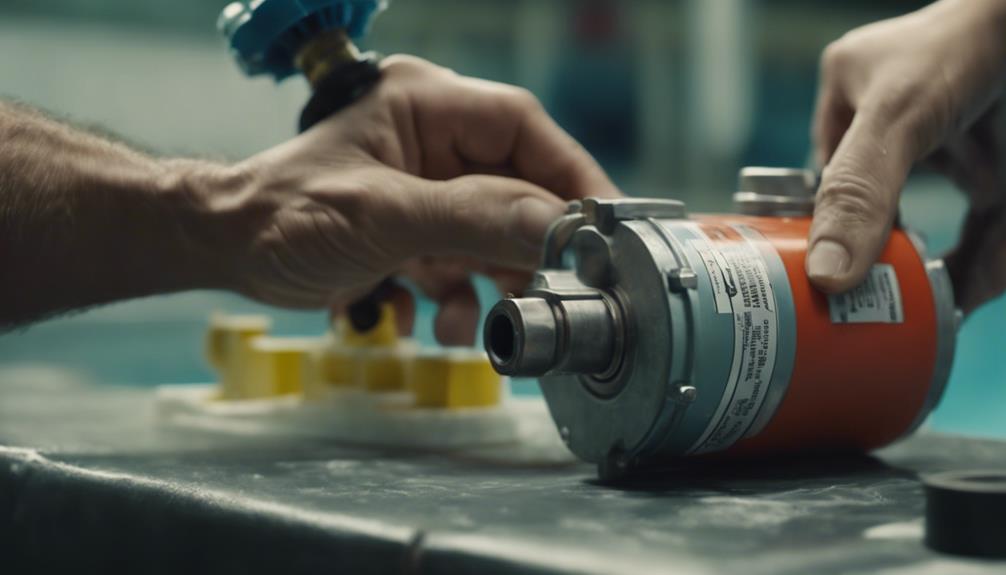
When it comes to pool maintenance, lubricating bearings is important for reducing friction and noise in your pump motor.
Different types of lubricants can be used, but it's vital to follow the manufacturer's recommendations to avoid damaging the bearings.
Proper lubrication techniques won't only extend the lifespan of the bearings but also improve the overall efficiency of your pool pump.
Bearing Lubrication Importance
Why is proper lubrication of bearings in pool pumps essential for peak performance?
Lubricating bearings in your pool pump is critical for maintaining its efficiency and longevity. Here are some important reasons why bearing lubrication is essential:
- Reduces Friction and Wear: Lubrication helps decrease friction between moving parts, preventing premature wear and tear on the bearings.
- Prevents Overheating: Proper lubrication guarantees that the bearings operate smoothly, reducing the risk of overheating and potential damage to the pump.
- Avoids Costly Repairs: Regular lubrication helps prevent bearing failure, which can lead to expensive repairs or even the need for a new pump.
- Optimizes Performance: Following manufacturer guidelines and using the recommended lubricant is crucial for keeping your pool pump running at its best.
Types of Lubricants
Selecting the suitable lubricant for your pool pump bearings is essential for peak performance and longevity. The two main categories of lubricants for bearings are oil-based and grease-based. Oil-based lubricants are ideal for high-speed bearings as they offer better heat dissipation, while grease-based lubricants are commonly used for low-speed bearings due to their superior sealing properties.
The decision between oil and grease lubricants depends on factors such as speed, load, temperature, and environment. Proper lubrication is vital for maintaining bearing performance and extending their lifespan.
When choosing a lubricant for your pool pump bearings, consider factors like the speed of rotation, the load the bearings will bear, the operating temperature, and the environment where the pump is installed, such as exposure to pool water and pH levels.
Proper Lubrication Technique
Properly lubricating bearings in your pool pump motor is crucial for reducing friction and extending their lifespan. When it comes to pool maintenance, making sure the bearings are properly lubricated can help prevent common problems that may arise.
Here are some tips for the proper lubrication technique:
- Choose the right lubricant: Select a lubricant specifically designed for pool pump bearings to guarantee peak performance.
- Avoid over-lubrication: Applying too much lubricant can attract dirt and debris, potentially causing damage to the bearings.
- Follow manufacturer guidelines: Adhere to the manufacturer's recommendations for the frequency of lubrication to keep the bearings in top-notch condition.
- Regular maintenance: Incorporate lubricating the bearings into your routine pool cleaning schedule to prevent costly repairs down the line.
Priming Pump
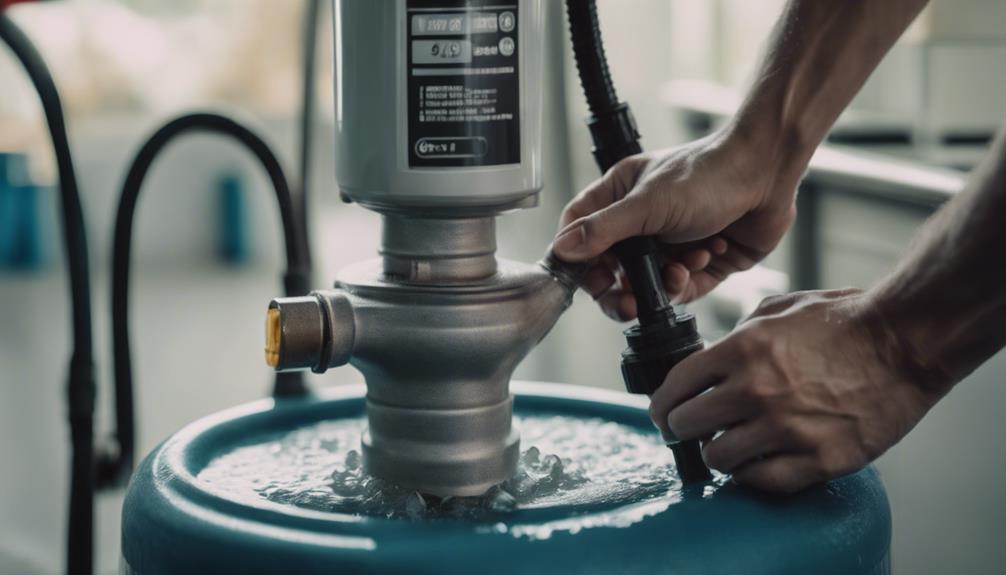
To guarantee proper priming of your pool pump, begin by checking for any debris clogging the pump intake.
Troubleshooting the priming pump is essential for efficient water circulation and filtration.
Inspect the pump impeller for damage that could hinder the priming process.
Tighten any loose pump components to establish a secure connection and prevent priming issues.
Remember to lubricate the pump motor bearings to reduce friction and enhance priming efficiency.
Proper priming is vital for maintaining a healthy pool environment.
By addressing these common issues, you can ensure that your pump primes effectively, allowing it to function efficiently in keeping your pool water clean and clear.
Keep these tips in mind to troubleshoot and resolve any priming problems that may arise, ensuring your pool pump operates smoothly for a rejuvenating swimming experience.
Frequently Asked Questions
What Should I Fix First in My Pool Water?
First, check the pH levels for proper balance. Clean the pool filter to enhance clarity. Address visible algae with brushing, vacuuming, and algaecide. Repair leaks to prevent damage. Finally, troubleshoot equipment issues for a safe swim.
Why Is My Pool Not Responding to Shock?
You've diligently shocked your pool, but it's still not playing nice? Maybe it's those sneaky organic contaminants or the recent pool parties. Test pH levels, stabilize, or call a pro for clarity!
How to Get Brown Pool Water Clear Fast?
To get brown pool water clear fast, test it first to find the cause. Shock it with chlorine to kill algae and bacteria. Consider a metal sequestrant for stains. Clean and maintain the filter regularly to prevent issues.
How Do I Know if My Pool Needs More Shock?
Feeling like your pool's lost its sparkle? Check for cloudy water, a strong chlorine smell, or a green tint. Test regularly for low chlorine levels, especially after heavy use or rainy days. Time for a shock treatment!
What Pool Problems Can Affect the pH Levels of the Pool?
Several pool problems can affect maintaining pool pH levels stepbystep. Issues such as high levels of rainfall, leaves and debris in the pool, and the overuse of chlorine can all disrupt the pH balance. It’s important to regularly test and adjust the pH levels to ensure a safe and properly functioning pool.
Conclusion
To sum up, taking care of common pool problems doesn't have to be a challenging task. By addressing issues like pump noise, water clarity, and stain removal, you can keep your pool in top shape all summer long.
Did you know that regular maintenance can help prevent up to 80% of pool problems? By staying on top of maintenance tasks and troubleshooting issues promptly, you can enjoy a clean and pristine pool for years to come.
